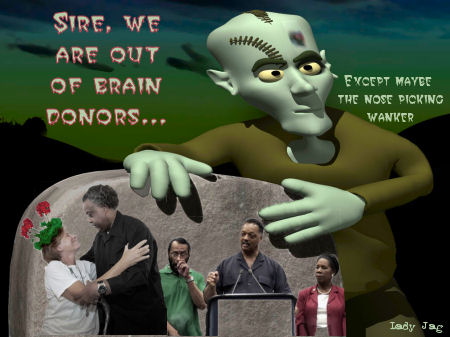Okay
WARNING!!!

Posted on 06/01/2006 1:08:49 PM PDT by Buck Ninety-Nine
WASHINGTON, May 31 — After vowing to steer a greater share of antiterrorism money to the highest-risk communities, Department of Homeland Security officials on Wednesday announced 2006 grants that slashed money for New York and Washington 40 percent, while other cities including Omaha and Louisville, Ky., got a surge of new dollars.
Homeland security officials said the grants were a result of a more sophisticated evaluation process
(Excerpt) Read more at nytimes.com ...
Oh dear, I tried a sonnet one time. It was pretty, but was not a sonnet.
I just don't have the patience/discipline for sonnet writing.
I don't write haiku.
It messes up my rhythm,
For important things.
If one goes out in the evening and watch the sunset, the stars come out and the moon rise, and see that as people coming into a theater or some such that would be done late Victorian, it is extremely clear and rich for such a short verse.
Not as fun as Dover Beach, though, which I believe is probably the best of the Victorian poems.
The sea is calm to-night.
The tide is full, the moon lies fair
Upon the straits; -on the French coast the light
Gleams and is gone; the cliffs of England stand,
Glimmering and vast, out in the tranquil bay.
Come to the window, sweet is the night air!
Only, from the long line of spray
Where the sea meets the moon-blanch'd land,
Listen! you hear the grating roar
Of pebbles which the waves draw back, and fling,
At their return, up the high strand,
Begin, and cease, and then again begin,
With tremulous cadence slow, and bring
The eternal note of sadness in.
Sophocles long ago
Heard it on the Aegean, and it brought
Into his mind the turbid ebb and flow
Of human misery; we
Find also in the sound a thought,
Hearing it by this distant northern sea.
The Sea of Faith
Was once, too, at the full, and round earth's shore
Lay like the folds of a bright girdle furl'd.
But now I only hear
Its melancholy, long, withdrawing roar,
Retreating, to the breath
Of the night-wind, down the vast edges drear
And naked shingles of the world.
Ah, love, let us be true
To one another! for the world, which seems
To lie before us like a land of dreams,
So various, so beautiful, so new,
Hath really neither joy, nor love, nor light,
Nor certitude, nor peace, nor help for pain;
And we are here as on a darkling plain
Swept with confused alarms of struggle and flight,
Where ignorant armies clash by night.
[1867]
It was certainly the best poem Arnold ever wrote. And I read an awful lot of his poetry. If my Victorian prof hadn't had moved on to greener pastures, I would have done a master's thesis on Matthew Arnold.
She could have been referring to the punctuality of three score and ten, or some other secret, I agree.
Poets are a crafty lot.
The Gooseberry Bush.
On the bank, near the creek,
Spring would bring a little peek
as the bush grew out of the snow
we knew the fruit it would bear
in Summer days as we walked near.
Lush, fat, green, white Gooseberries
harvested by a little child’s hands
eaten with relish and promise grand
juicy sweet berries, a succulent treat
eaten on the way to the swimming pool
in the creek.
Mother never could gather enough of them
for a Gooseberry Jam or Jelly
those precious, sweet jewels always
found their way into my belly.
bentfeather (c) 07.30.06
I'd bet "To His Coy Mistress" gets quoted more, even though it does not use his descriptive power to set the stage of quiet sadness.
I'd say you were somewhat inspired to write that.
Did your mother write poetry? She may have taken it up, in addition to choir practice ...
I'll confess. I was probably thinking of Andrew Marvell and Matthew Arnold in the same mental circle.
No, my mom did not write poetry and was quite mystified when I began.
I was told though, my grandmother wrote some, must have been in Finnish, although I don't know when she found the time.
I do believe that "To His Coy Mistress" is by Marvell, not Arnold, but that's ok.
Arnold's poem to me (which he wrote on his honeymoon, btw) captures that spirit of mid-Victorian intellecual stuff that morphs into things like Thomas Hardy's "Hap," and eventually into things like Sartre's Nausee and what they used to call the "modern malaise" to only come crashing down into waves of deconstructionism, to be replaced by the postmodernist sychronistic-gnostic-meanless relativism that's floating around today.
One does need to read the Dover B*tch to get even more insight...
A Criticism of Life: for Andrews Wanning
So there stood Matthew Arnold and this girl
With the cliffs of England crumbling away behind them,
And he said to her, 'Try to be true to me,
And I'll do the same for you, for things are bad
All over, etc., etc.'
Well now, I knew this girl. It's true she had read
Sophocles in a fairly good translation
And caught that bitter allusion to the sea,
But all the time he was talking she had in mind
The notion of what his whiskers would feel like
On the back of her neck. She told me later on
That after a while she got to looking out
At the lights across the channel, and really felt sad,
Thinking of all the wine and enormous beds
And blandishments in French and the perfumes.
And then she got really angry. To have been brought
All the way down from London, and then be addressed
As a sort of mournful cosmic last resort
Is really tough on a girl, and she was pretty.
Anyway, she watched him pace the room
And finger his watch-chain and seem to sweat a bit,
And then she said one or two unprintable things.
But you mustn't judge her by that. What I mean to say is,
She's really all right. I still see her once in a while
And she always treats me right. We have a drink
And I give her a good time, and perhaps it's a year
Before I see her again, but there she is,
Running to fat, but dependable as they come.
And sometimes I bring her a bottle of Nuit d' Amour.
forgot: The Dover B*tch was written by Anthony Hecht
When "ignorant armies clash by night" it does not pay to be the most ignorant army on the plain.
The wives and lovers of poets often have a long-suffering role.
Okay
WARNING!!!


when one is a muse, one better be easily amused...
You know you are getting me started playing with stuff I am good at playing with...I loved studying literature as an intellectual game...I don't take it nearly as seriously as I do history and politics, but it was always fun.
Thomas Hardy's Hap (I hate Hardy's fiction, but I did like his poetry a lot)
If but some vengeful god would call to me
From up the sky, and laugh: “Thou suffering thing,
Know that thy sorrow is my ecstasy,
That thy love’s loss is my hate’s profiting!”
Then would I bear, and clench myself, and die,
Steeled by the sense of ire unmerited;
Half-eased, too, that a Powerfuller than I
Had willed and meted me the tears I shed.
But not so. How arrives it joy lies slain,
And why unblooms the best hope ever sown?
--Crass Casualty obstructs the sun and rain,
And dicing Time for gladness casts a moan….
These purblind Doomsters had as readily strown
Blisses about my pilgrimage as pain.
__________
This always seemed rather self-indulgent. I suspect that, in the words of Leonard Cohen "Though mountains danced before them/they said that God was dead" that Hardy needed to believe this to sustain his world view, and couldn't accept anything else.
There is something romanticly powerful about seeing yourself as the doomed hero standing up against the uncaring universe, very much in the mode of the samurai who knows he will die at the end, but still does the best that he can....
(There's a Japanese film called Hara Kiri that explores this well.)
Dang, there you got me doing it again. Help! I need a lit crit exorcism.....
LOL!!!!!
I am duly amused!
I'm duly sometimes, too!
Truly duly!
Did you kill the thread?
Of is it the ghost of English courses past?
Disclaimer: Opinions posted on Free Republic are those of the individual posters and do not necessarily represent the opinion of Free Republic or its management. All materials posted herein are protected by copyright law and the exemption for fair use of copyrighted works.